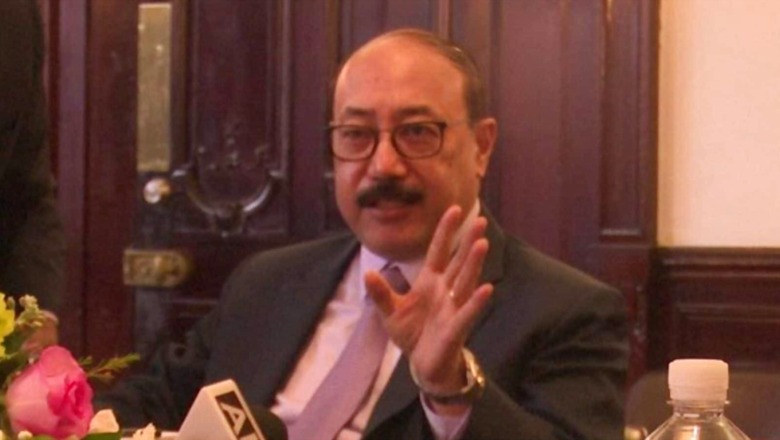
views
The recent incident in Texas once again demonstrates that the international terror network, with its epicentre in India's neighbourhood, is very much active, Foreign Secretary Harsh Vardhan Shringla said on Friday, asserting that this is a global threat that requires an unambiguous and collective response. Malik Faisal Akram, a British hostage-taker shot dead by the FBI to end a siege at a synagogue in Texas recently, had demanded the release of Pakistani neuroscientist Afia Siddiqui suspected of ties with Al Qaeda.
Addressing a symposium on the Potential for Indo-European/German cooperation in the Indo-Pacific, Shringla also said India sees the Indo-Pacific as a free, open, inclusive region, which embraces all in a common pursuit of progress and prosperity. Our Prime Minister has encapsulated this vision in one term- SAGAR, which stands for Security and Growth for All in the Region. The term SAGAR itself means 'Ocean' in several Indian languages, he said. India believes that our common prosperity and security require us to evolve, through dialogue, a common rules-based order for the region. Such an order must respect the sovereignty and territorial integrity, as well as equality of all nations, Shringla asserted.
Such an order should enable all countries to use common spaces on sea and in the air, engage in unimpeded commerce, and peacefully settle disputes in accordance with international law, he said. India's record of respecting and accepting the International Tribunal for the Law of the Sea (ITLOS) verdict on the delimitation of our maritime boundaries with two of our neighbours Bangladesh and Myanmar, speaks for itself, Shringla said.
Noting that counterterrorism is another key area of cooperation between strategic partners, Shringla said failure to cooperate can only embolden terrorists towards more audacity. You would recall the horrific 26/11 Mumbai terrorist attack in which Indian, German and other nationals had lost their lives. The recent incident in Texas, United States, once again demonstrates that the international network of terror, with its epicentre in India's neighbourhood, is very much active and has long-lasting implications," he said during the ORF-NMF-KAS Symposium. This is a global threat that requires an unambiguous, undivided, effective and collective response, the foreign secretary asserted.
External Affairs Minister S Jaishankar had stated at the UN Security Council that "there cannot be any exception or any justification for any act of terrorism, regardless of motivations behind such acts", Shringla said. "Just two days ago, India reiterated its position when it conveyed that any attack on innocent civilians and civilian infrastructure was completely unacceptable; would be in blatant violation of international law; and against all civilized norms," he pointed out.
Shringla said Europe and the Indo-Pacific regions are closely interlinked through strong trade and investment linkages. Noting that developments in the Indo-Pacific can have a direct bearing on European economies, he said the impact of the recent supply chain disruptions was felt by all. The global challenges of sustainable development, environmental protection and climate change are more acute in the region, he said. They can only be addressed through collaborative effort that promotes linkages rather than economic dependencies and debt traps, he asserted. "Therefore, we believe that all countries, including those outside the region with a clear stake in the security and stability of the region, have an important role to play," Shringla said.
"It is in this context that we have welcomed the growing interest among our European partners, including Germany, to intensify their engagement in the Indo-Pacific region. We are happy to note the commitment of the new coalition government in Germany for a free and open Indo-Pacific region based on global norms and international law," he said. The priorities identified in Germany's Guidelines on the Indo-Pacific, particularly strengthening multilateralism, the rule of law and democracy, climate protection, trade and digitalisation, closely match with our interests, he said. "Going forward, we could broaden the scope for collaboration to include security issues in the region through joint efforts in the capacity building against piracy, IUU fishing and other maritime challenges," the foreign secretary said.
As Germany's strategic partner in the region, he said he would like to welcome the German naval frigate Bayern, which is making its port call in Mumbai from Friday. Yesterday, I was happy to meet the Chief of Naval Staff of Germany Vice Admiral Kay-Achim Schnbach, who is on a visit to India. I am confident that the frigate Bayern's visit will be an important milestone in Germany's sustained and active engagement in the Indo-Pacific and will contribute towards reaffirming a free, open and rules-based Indo-Pacific, he said.
Read all the Latest India News here




















Comments
0 comment